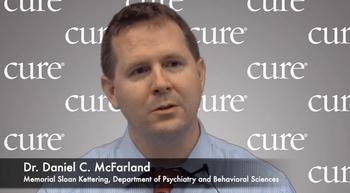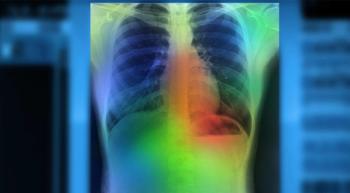
Tumor mutation burden may be an independent predictor of developing depression in patients with lung cancer, according to Dr. Daniel McFarland.

Tumor mutation burden may be an independent predictor of developing depression in patients with lung cancer, according to Dr. Daniel McFarland.

The growing use of telecommunication and technology to provide health care – or telemedicine – offers many advantages, but also comes with challenges, says one expert.

Trilaciclib, an intravenous CDK 4/6 inhibitor, in combination with Hycamtin may reduce chemotherapy-induced myelosuppression in small cell lung cancer, according to one expert.

From cancer-sniffing dogs to music therapy for pain, here’s what is making headlines in the cancer space this week.

Routine use of prophylactic radiotherapy in patients with malignant pleural mesothelioma is unnecessary following a chest wall procedure, according to multicenter, open-label, phase 3, randomized controlled trial findings published in the Journal of Clinical Oncology.

Results from a clinical trial in people with mesothelioma indicate that an experimental chimeric antigen receptor-T cell therapy is safe and may provide benefit to patients, especially in combination with other immunotherapies.

The Food and Drug Administration approved Keytruda for the treatment of patients with metastatic small cell lung cancer.

Maintenance therapy with defactinib failed to improve survival following front-line chemotherapy in patients with merlin-low malignant pleural mesothelioma, according to results from the phase 2 COMMAND trial.

Autoimmune skin toxicities in patients with non-small cell lung cancer mean patients may respond better to immune checkpoint inhibitors.

In this week’s episode of the “CURE® Talks Cancer” podcast, we spoke with a caregiver who found hope in the darkness after losing her son to lung cancer at just 29 years old.

I have stage 4 lung cancer and told I had 12-18 months to live. Little did I know they sent a biopsy off for genome testing which has given me six years so far. My life is incredibly imperfect, but I love every single minute of it.

Jennifer King, from the GO2 Foundation for Lung Cancer, discussed what patients can do to help address the stigma associated with lung cancer.

Genomic testing has transformed the therapeutic landscape of lung cancer in recent years, but there is still room for improvement, says one expert.

Here are the top 5 CURE stories for May 2019.

The Food and Drug Administration has approved the NovoTTF-100L System in combination with pemetrexed and platinum-based chemotherapy for the front-line treatment of patients with unresectable, locally advanced or metastatic malignant pleural mesothelioma.

Precision medicine has prolonged life for many with lung cancer, giving them opportunities to support those who are newly diagnosed.

"Alvin David, B.S.N., RN-BC, wrote this exemplar as part of his promotion to clinical nurse 3. I will let his words do the talking, as they reveal his true essence as a nurse, colleague, preceptor, friend, father, husband and extraordinary healer," wrote Margie McDonald, M.S.N., RN, CBCN of Memorial Sloan Kettering Monmouth.

We've got a sneak peek at what’s inside CURE®'s lung cancer special issue.

With nearly 30 years of experience in thoracic oncology, one expert discusses what lies ahead for patients with small cell lung cancer.

LUNGevity’s annual summit helps people with lung cancer live better and stay informed.

Thousands of new patients are now able to enroll in Lung Cancer Master Cancer Protocol, a National Cancer Institute trial. Criteria have been expanded to allow patients with all types of non-small cell lung cancer.

Two husbands embrace changing and challenging roles at home when they learn of their spouses’ cancer diagnoses.

A pre-surgical shape-up could improve recovery for patients with lung cancer. Although the findings are still emerging, some researchers think that prehab may be a key player that will improve patient outcomes in this changing environment.

Testing for genomic mutations in lung cancer helps pinpoint targeted therapies.

Researchers examined the prevalence of chronic opioid use among survivors of breast, colorectal and lung cancer.